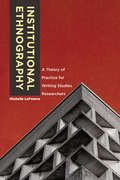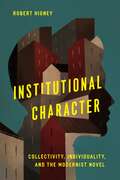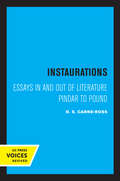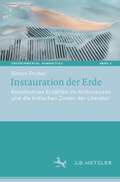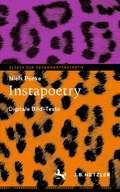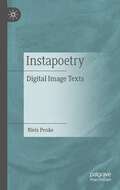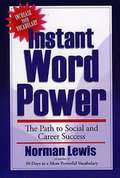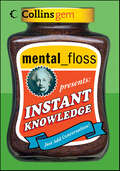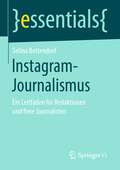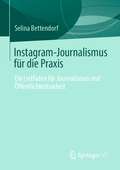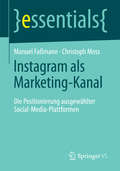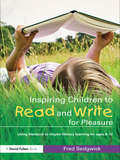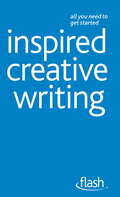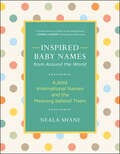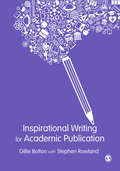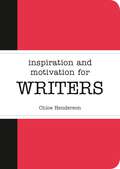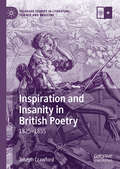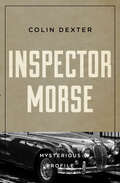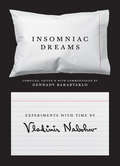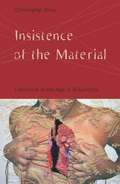- Table View
- List View
Institutional Ethnography: A Theory of Practice for Writing Studies Researchers
by Michelle LaFranceA form of critical ethnography introduced to the social sciences in the late 1990s, institutional ethnography uncovers how things happen within institutional sites, providing a new and flexible tool for the study of how “work” is co-constituted within sites of writing and writing instruction. The study of work and work processes reveals how institutional discourse, social relations, and norms of professional practice coordinate what people do across time and sites of writing. Adoption of IE offers finely grained understandings of how our participation in the work of writing, writing instruction, and sites of writing gives material face to the institutions that govern the social world. In this book, Michelle LaFrance introduces the theories, rhetorical frames, and methods that ground and animate institutional ethnography. Three case studies illustrate key aspects of the methodology in action, tracing the work of writing assignment design in a linked gateway course, the ways annual reviews coordinate the work of faculty and writing center administrators and staff, and how the key term “information literacy” socially organizes teaching in a first-year English program. Through these explorations of the practice of ethnography within sites of writing and writing instruction, LaFrance shows that IE is a methodology keenly attuned to the material relations and conditions of work in twenty-first-century writing studies contexts, ideal for both practiced and novice ethnographers who seek to understand the actualities of social organization and lived experience in the sites they study. Institutional Ethnography expands the field’s repertoire of research methodologies and offers the grounding necessary for work with the IE framework. It will be invaluable to writing researchers and students and scholars of writing studies across the spectrum—composition and rhetoric, literacy studies, and education—as well as those working in fields such as sociology and cultural studies.
Institutional Character: Collectivity, Individuality, and the Modernist Novel (Cultural Frames, Framing Culture)
by Robert HigneyHow do our institutions shape us, and how do we shape them? From the late nineteenth-century era of high imperialism to the rise of the British welfare state in the mid-twentieth century, the concept of the institution was interrogated and rethought in literary and intellectual culture. In Institutional Character, Robert Higney investigates the role of the modernist novel in this reevaluation, revealing how for a diverse array of modernist writers, character became an attribute of the institutions of the state, international trade, communication and media, labor, education, public health, the military, law, and beyond.In readings of figures from the works of E. M. Forster, Joseph Conrad, and Virginia Woolf to Mulk Raj Anand, Elizabeth Bowen, and Zadie Smith, Higney presents a new history of character in modernist writing. He simultaneously tracks how writers themselves turned to the techniques of fiction to help secure a place in the postwar institutions of literary culture. In these narratives—addressing imperial administrations, global financial competition, women’s entry into the professions, colonial nationalism, and wartime espionage—we are shown the generative power of institutions in preserving the past, designing the present, and engineering the future, and the constitutive involvement of individuals in collective life.
Instaurations: Essays in and out of Literature Pindar to Pound
by D. S. Carne-RossThis book presents a sequence of six related studies of poets from classical antiquity to the present (Pindar and Sophocles at one end, Pound at the other, with Dante somewhere in the middle). This group of literary essays is framed by two more general papers showing how the texts can reach out into our society and into the lives we lead there--and can question the lives we lead. the opening paper argues for a way of reading (as rigorous as those honored in the academy but directed to different ends) that would restore to literature its old didactic function, and the final paper searches for a place where such a reading might be possible--a way of reading that would also be a way of living. Literature matters, more than it ever has before, because it is the strongest remaining witness to much that mankind has always known but is now in danger of losing. It can tell us things about human being and about nature and about "the gods" that we have forgotten. But it can do so only if we read very hard, hence the body of this book consists of close textual studies of poets old and new that will be of value even to those who are disturbed by the author's views on the role of literature today. The word "instauration" means renewal and is also intended to point to a conception of poetry as celebration. Beyond that, it means a founding, the sense Bacon had in mind when he called his program for the advancement of natural science Instauratio magna. Three and half centuries later, we may be coming to the end of the great movement at whose beginnings Bacon stood. If so, the question that faces us all is, What comes next, what new founding is possible? This books looks forward to another instauration: One to which poetic thinking will have more contribute. This title is part of UC Press's Voices Revived program, which commemorates University of California Press's mission to seek out and cultivate the brightest minds and give them voice, reach, and impact. Drawing on a backlist dating to 1893, Voices Revived makes high-quality, peer-reviewed scholarship accessible once again using print-on-demand technology. This title was originally published in 1979.
Instauration der Erde: Konstitutives Erzählen im Anthropozän und die kritischen Zonen der Literatur (Environmental Humanities #2)
by Simon ProbstMit dem Anthropozän wird oft das Entstehen einer planetaren Universalität und die ‚Wiederkehr der großen Erzählungen‘ verknüpft. Die Verflechtungen von Menschen und Erde werden hier zur Grundlage kultureller Selbstverständigung. Das Buch untersucht strukturelle Merkmale und Problemkonstellationen dieser erdgebundenen konstitutiven Erzählungen. Wie können sie globale Ungleichheiten berücksichtigen? Wie lassen sie die Erde und andere Spezies zu Wort kommen? Inwiefern sind diese Erzählungen selbst planetare Kräfte? Und: Wie kann das Eigenwissen der Literatur unseren Blick auf die Erde erweitern? Diese Fragen werden im Dialog von Wissenschaft und Literatur untersucht. Eingehende Lektüren verbinden kanonische Texten des Anthropozän-Diskurses (z.B. Dipesh Chakrabarty, Donna Haraway, Bruno Latour und Isabelle Stengers) mit literarischen Stimmen (Ursula K. Le Guin, Daniel Falb, Christoph Ransmayr).
Instapoetry: Digitale Bild-Texte (Essays zur Gegenwartsästhetik)
by Niels PenkeInstapoetry zählt zu den populärsten literarischen Phänomenen der Gegenwart. In wenigen Jahren sind Millionen von kurzen bis ultra-kurzen Texten auf Instagram publiziert und geteilt worden. Im Kampf um Aufmerksamkeit mit unzähligen anderen Texten müssen die Mechanismen der Plattform und die Nutzungsroutinen der User bedient werden. Der äußere Druck auf die literarische Produktion ist immens. Das Buch erklärt die Produktionsstrategien und Rezeptionsverfahren von Instapoetry, erläutert ihre Entwicklung und verortet ihre Bedeutung – irgendwo zwischen letzter Verfallsstufe und Zukunft der Lyrik.
Instapoetry: Digital Image Texts
by Niels PenkeInstapoetry is one of the most popular literary phenomena of our time. In just a few years, millions of short to ultra-short texts have been published and shared on Instagram. In the battle for attention with countless other texts, the mechanisms of the platform and the usage routines of the users have to be served. The external pressure on literary production is immense. The book explains the production strategies and reception procedures of Instapoetry, explains its development and locates its significance - somewhere between the last stage of decay and the future of poetry.
Instant Word Power
by Norman LewisThis rapid vocabulary builder created by Norman Lewis is a foolproof method of increasing your vocabulary. Learn the derivation and meaning of thousands of words.
Instant Knowledge (Collins Gem)
by Editors of Mental FlossMental_floss is proud to present a full-bodied jolt of inspiration for thirsty minds on the go. Blended with titillating facts, startling revelations, and head-scratching theories collected from around the world, Instant Knowledge will jumpstart riveting exchanges at cocktail parties, the watercooler, or any powwow. To experience the clean, rich flavor at home, just tear into a topic of your choice, and add conversation. It's that simple!
Instagram-Journalismus: Ein Leitfaden für Redaktionen und freie Journalisten (essentials)
by Selina BettendorfSelina Bettendorf bietet Social-Media-Redakteuren einen einfachen und praktischen Leitfaden, wie sie professionellen Instagram-Journalismus betreiben können. Instagram ist eine Social-Media-Plattform, auf der Bilder und Videos auf einer Startseite (Feed) und in einem neuen Storyformat geteilt werden und die vor allem von jungen Menschen genutzt wird. Die Anzahl der Nutzer wächst rasant; so wird Instagram in der Zukunft des Journalismus eine ausschlaggebende Rolle spielen. Die Autorin thematisiert deshalb, wie Instagram-Beiträge im Feed möglichst viele Menschen erreichen und wie sich Medienunternehmen erfolgreich auf der Plattform präsentieren können. Außerdem erklärt sie, wie qualitativ hochwertiger Journalismus in den Instagram-Storys funktioniert und wie aus Instagram-Followern regelmäßige Besucher der Homepage oder E-Paper-Leser werden können.Die Autorin: Selina Bettendorf ist Absolventin des Masterstudiengangs Medien-Ethik-Religion an der FAU Erlangen-Nürnberg und arbeitet nun als Volontärin bei einer Berliner Tageszeitung.
Instagram-Journalismus für die Praxis: Ein Leitfaden für Journalismus und Öffentlichkeitsarbeit
by Selina BettendorfDieses Buch bietet einen praktischen Leitfaden für Journalismus auf Instagram. Es gibt sowohl die Grundlagen für Instagram-Journalismus, als auch Tipps und Tricks für Profis. Deshalb spielt es keine Rolle, ob die Leserin oder der Leser mit der Plattform schon vertraut ist oder noch nicht. Instagram ist die Plattform, um junge Menschen zu erreichen. Es wird erklärt, wie durch gute Inhalte auf der Plattform aus Instagram-Followern regelmäßige Besucher*innen der Homepage oder E-Paper-Leser*innen werden können. Zusätzlich gibt es Anleitungen für die Community-Arbeit und Ideen, wie Instagram als Recherchequelle genutzt werden kann. Außerdem bietet das Buch praktische Informationen für TV- und Radiojournalist*innen und eine Einführung in Instagram für die Öffentlichkeitsarbeit.
Instagram als Marketing-Kanal: Die Positionierung ausgewählter Social-Media-Plattformen (essentials)
by Christoph Moss Manuel FaßmannManuel Fa#65533;mann und Christoph Moss f#65533;hren eine empirische Untersuchung der Charakterisierungen von Instagram, Facebook und Twitter aus der Sicht von Nutzern und Unternehmen durch. Das essential enth#65533;lt einen ausf#65533;hrlichen Vergleich der Kerneigenschaften dieser Plattformen. Die ausgew#65533;hlten Social-Media-Kan#65533;le werden anhand der analysierten Eigenschaften der Plattformen im Kommunikationsmix des Social-Media-Marketing (SMM) positioniert. Auf diese Weise vermittelt das essential die elementaren Grundlagen f#65533;r eine effektive und ad#65533;quate SMM-Strategieformulierung. Der Inhalt Moderne Markenf#65533;hrung Instagram als Marketing-Kanal: Strukturen, Funktionsweise und Relevanz Charakterisierung und Positionierung der Social-Media-Plattformen Instagram, Facebook und Twitter Die Zielgruppen Studierende und Dozierende der Sozial- und Kommunikationswissenschaften sowie der Betriebswirtschaftslehre Fach- und F#65533;hrungskr#65533;fte im Bereich Marketing und Kommunikation sowie Unternehmer und Selbstst#65533;ndige Die Autoren Manuel Fa#65533;mann, B. A. , absolviert ein PR-Volontariat und studiert Public Relations sowie Corporate Communication (M. A. ) an der Business and Information Technology School (BiTS) in Iserlohn. Prof. Dr. Christoph Moss leitet das Mediainstitut f#65533;r Marketing und Kommunikationsforschung an der BiTS-Hochschule in Iserlohn und unterrichtet dort Journalismus und Unternehmenskommunikation. Dar#65533;ber hinaus ber#65533;t er Unternehmen zu allen Fragen der Kommunikation.
Inspiring Fellini
by Federico PacchioniFederico Fellini is considered one of the greatest cinematic geniuses of our time, but his films were not produced in isolation. Instead, they are the results of collaborations with some of the greatest scriptwriters of twentieth-century Italy. Inspiring Fellini re-examines the filmmaker's oeuvre, taking into consideration the considerable influence of his collaborations with writers and intellectuals including Pier Paolo Pasolini, Ennio Flaiano, Tullio Pinelli, and Andrea Zanzotto. Author Federico Pacchioni provides a portrait of Fellini that is more complex than one of the stereotypical solitary genius, as he has been portrayed by Fellini criticism in the past. Pacchioni explores the dynamics of Fellini's cinematic collaborations through analyses of the writers' independently produced works, their contributions to the conceptualization of the films, and their conversations with Fellini himself, found in public and private archival sources. This book is an invaluable resource in the effort to understand the genesis of Fellini's artistic development.
Inspiring Children to Read and Write for Pleasure: Using Literature to Inspire Literacy learning for Ages 8-12
by Fred Sedgwick"A marvellous book of great practical value" – James Carter The lack of interest in reading for pleasure amongst large numbers of primary age pupils, put off by ‘mechanical’ worksheet-driven approaches, is a cause for major concern amongst education professionals and parents. However, Inspiring Children to Read and Write for Pleasure from writer, journalist and education commentator Fred Sedgwick uses the context of literature to illuminate and inform the teaching of literacy in the primary classroom and inspire children to a love of books. Aimed at Year 4, 5 and 6 primary pupils, but also significant as a transitions text to teaching secondary school pupils, this book shows how children’s fluency in language - their thinking, their talking, their reading, their listening and their writing – can be greatly improved and enriched through contact with literature placed in an understandable context. With both focus on prose and poetry, primary pupils will be introduced to using grammar, syntax and sentence construction skills in meaningful contexts. Through the use of inspiring case studies, schedules of work and practical classroom applications as well as literary figures like Dickens, Coleridge, Carroll, Rossetti and Shakespeare, primary school children can enjoy reading and writing again. With a number of sample passages to use, teaching guidelines and examples of children’s work, this book will be of great interest to literacy coordinators, practicing Primary PGCE and Key Stage 2 teachers and those on BA Primary/B’Ed courses.
Inspired Creative Writing: Flash
by Stephen MayThe books in this bite-sized new series contain no complicated techniques or tricky materials, making them ideal for the busy, the time-pressured or the merely curious. Inspired Creative Writing is a short, simple and to-the-point guide to learning the basic principles of creative writing in a few short steps. Whether writing a novel, poetry, non-fiction or just experimenting, in just 96 pages you will discover how to master the essential principles and create captivating and memorable work.
Inspired Creative Writing: Flash
by Stephen MayThe books in this bite-sized new series contain no complicated techniques or tricky materials, making them ideal for the busy, the time-pressured or the merely curious. Inspired Creative Writing is a short, simple and to-the-point guide to learning the basic principles of creative writing in a few short steps. Whether writing a novel, poetry, non-fiction or just experimenting, in just 96 pages you will discover how to master the essential principles and create captivating and memorable work.
Inspired Baby Names from Around the World: 6,000 International Names and the Meaning Behind Them
by Neala ShaneThousands of Names and the Blessings They Can Impart This unique guide includes 6,000-plus names from all corners of the globe, and each entry illuminates the name’s distinctive spiritual, historical, and cultural background — its poetry. Names, from the traditional to the newly coined, are fully explained. Pronunciation guide, origin, alternate spellings, and meaning are enhanced by the affirmation carefully chosen for each name. Lists of names by meaning, names by ethnicity, and most popular names by decade provide easy reference. Whether your aim is to honor ancestors, capture a child’s essence, or convey parental hopes, Inspired Baby Names from Around the World will help you greet and bless your new baby with heartfelt meaning.
Inspirational Writing for Academic Publication
by Gillie E Bolton Stephen RowlandDo you feel under increasing pressure to produce high quality publications, or struggle to translate your great ideas into inspirational - and engaging - writing? Gillie Bolton introduces her three 'key phases' method (Write for Myself, Redraft for my Reader, Edit for Posterity) to make the writing process less daunting, and offers support and advice on how to develop your own writing voice to use this to engage readers in your research. 'Characters' at different career stages help you to identify your own writing level, and before and after examples of work from a range of disciplines clearly illustrate the key writing techniques. Drawing on case studies, as well as their own extensive writing experience, the authors suggest strategies for dealing with common difficulties such as: Time and energy management Restoring flagging enthusiasm Maintaining inspiration Dealing with potential burnout and writer's block. Each chapter concludes with a set of constructive exercises which develop these critical skills and inspire you to improve and enjoy your own academic writing. Ideal for upper level students and early career researchers. Dr Gillie Bolton is an international authority on writing and author of a long publication list including nine books, academic papers, as well as professional articles, poetry, and for a lay readership. Stephen Rowland, Emeritus Professor of University College London, is author of four books on the nature of research and learning in a range of contexts.
Inspiration and Motivation for Writers
by Chloe HendersonThis colourful little book of uplifting quotes and tailored tips delivers motivational sparks and creative signposts for writers. Read it, write on it, put it in a frame on your desk – whatever you do with it, the aim is simple: to get you writing!
Inspiration and Motivation for Writers
by Chloe HendersonThis colourful little book of uplifting quotes and tailored tips delivers motivational sparks and creative signposts for writers. Read it, write on it, put it in a frame on your desk – whatever you do with it, the aim is simple: to get you writing!
Inspiration and Insanity in British Poetry: 1825–1855 (Palgrave Studies in Literature, Science and Medicine)
by Joseph CrawfordThis book explores the ways in which poetic inspiration came to be associated with madness in early nineteenth-century Britain. By examining the works of poets such as Barrett, Browning, Clare, Tennyson, Townshend, and the Spasmodics in relation to the burgeoning asylum system and shifting medical discourses of the period, it investigates the ways in which Britain’s post-Romantic poets understood their own poetic vocations within a cultural context that insistently linked poetic talent with illness and insanity. Joseph Crawford examines the popularity of mesmerism among the writers of the era, as an alternative system of medicine that provided a more sympathetic account of the nature of poetic genius, and investigates the persistent tension, found throughout the literary and medical writings of the period, between the Romantic ideal of the poet as a transcendent visionary genius and the ‘medico-psychological’ conception of poets as mere case studies in abnormal neurological development.
Inspector Morse: A Mysterious Profile (Mysterious Profiles)
by Colin DexterThe international-bestselling author answers readers’ questions and discusses the origins of the Oxford inspector with a penchant for classical music.In 1975, Inspector Morse debuted, working to solve the case of a murdered hitchhiker in Colin Dexter’s Last Bus to Woodstock. The book led to a multimillion-bestselling mystery series and a television show that spawned a spinoff and a prequel. But how did the beloved DCI from Oxford come to be exactly?In this quick read, Colin Dexter addresses some of the many questions posed to him by his readers. He reveals what motived him to break into crime writing and which authors and novels influenced him. He discusses Morse’s many traits and inner workings, as well as how he got his first Morse novel published. He also shares how he maintains a discipline with writing, how he deals with critics, and what it’s like to transform a series of novels into a television series.Praise for the Inspector Morse Novels“[Morse is] the most prickly, conceited, and genuinely brilliant detective since Hercule Poirot.” —The New York Times Book Review“A masterful crime writer whom few others match.” —Publishers Weekly “Let those who lament the decline of the English detective story reach for Colin Dexter.” —The Guardian“It is a delight to watch this brilliant, quirky man [Morse] deduce.” —Minneapolis Star-Tribune
Insomniac Dreams: Experiments with Time by Vladimir Nabokov
by Vladimir Nabokov Gennady BarabtarloNabokov's dream diary, published for the first time—and placed in biographical and literary contextOn October 14, 1964, Vladimir Nabokov, a lifelong insomniac, began a curious experiment. Over the next eighty days, immediately upon waking, he wrote down his dreams, following the instructions he found in An Experiment with Time by the British philosopher John Dunne. The purpose was to test the theory that time may go in reverse, so that, paradoxically, a later event may generate an earlier dream. The result—published here for the first time—is a fascinating diary in which Nabokov recorded sixty-four dreams (and subsequent daytime episodes) on 118 index cards, which afford a rare glimpse of the artist at his most private. More than an odd biographical footnote, the experiment grew out of Nabokov’s passionate interest in the mystery of time, which influenced many of his novels, including the late masterpiece Ada.Insomniac Dreams, edited by leading Nabokov authority Gennady Barabtarlo, presents the text of Nabokov’s dream experiment, illustrated with a selection of his original index cards, and provides rich annotations and analysis that put them in the context of his life and writings. The book also includes previously unpublished records of Nabokov’s dreams from his letters and notebooks and shows important connections between his fiction and private writings on dreams and time.
Insistence of the Material: Literature in the Age of Biopolitics
by Christopher BreuInsistence of the Material engages with recent theories of materiality and biopolitics to provide a radical reinterpretation of experimental fiction in the second half of the twentieth century. In contrast to readings that emphasize the metafictional qualities of these works, Christopher Breu examines this literature&’s focus on the material conditions of everyday life, from the body to built environments, and from ecosystems to economic production. In Insistence of the Material, Breu rethinks contemporary understandings of biopolitics, affirming the importance of forms of materiality that refuse full socialization and resist symbolic manipulation. Breu considers a range of novels that reflect questions of materiality in a biopolitical era, including William Burroughs&’s Naked Lunch, Thomas Pynchon&’s V., J. G. Ballard&’s Crash, Dodie Bellamy&’s The Letters of Mina Harker, and Leslie Marmon Silko&’s Almanac of the Dead. Drawing from accounts of the emergence of immaterial production and biopolitics by Michel Foucault, Giorgio Agamben, Roberto Esposito, and Michael Hardt and Antonio Negri, Breu reveals the confrontational dimensions of materiality itself in a world devoted to the idea of its easy malleability and transcendence.Taking his analysis beyond the boundaries of literature, Breu argues that both materiality and subjectivity form sites of resistance to biopolitical control and that new developments in materialist theory advance a conception of social existence in which materiality—rather than language or culture—is the central term.
Insights-II (Basic English Textbook and Workbook B.Com. Semester-II)
by Dr P. B. Teggihalli Kavita KusugalInsights–II is a combined textbook and workbook designed for B.Com. second semester students of Rani Channamma University. It focuses on building a strong foundation in Basic English, incorporating grammar, vocabulary, reading comprehension, and writing skills. The book is structured to support both classroom learning and self-study, offering practical exercises and activities aimed at enhancing students’ communication abilities in academic and professional contexts.
